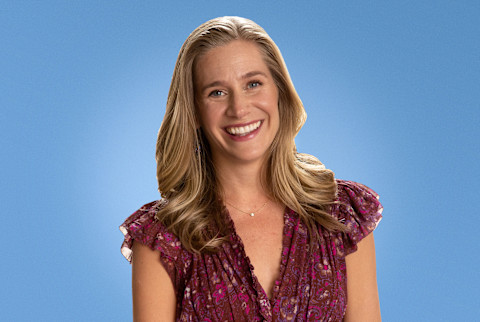3 Tips To Deal With COVID-Induced Anxiety, From Ellen Vora, MD

It's no secret that stress plays a significant role in our physical health. Similar to the importance of sleep, our stress levels have profound effects on our inflammation levels, which inherently affect our immune systems. It's no wonder many functional immunologists regard it as an integral part of the immune-boosting trifecta: eating well, getting plenty of sleep, and managing stress.
But it can be difficult—albeit, annoying—when people respond to your stress by saying, "Just don't stress!" It's especially frustrating as we face the anxiety surrounding COVID-19, when there's not much else to do but read the news or try to distract ourselves with home projects.
That's why we consulted holistic psychiatrist Ellen Vora, M.D., on this episode of the mindbodygreen podcast about the best ways to deal with our anxiety surrounding the coronavirus. While you can use these tricks no matter the time of year (global pandemic aside), keep these three tips in mind during your quarantine. The next time you feel yourself start to spiral, hopefully these methods (and a breathwork exercise or two) will help:
Make necessary changes to your information diet.
The first step, according to Vora, is to make conscious choices about how we're consuming our information—a mindful "information diet," if you will. It's no secret that there are some fearmongering headlines out there, and with public hysteria already climbing at a quick rate, sometimes a constant stream of news does more harm than good.
Vora's advice? "Choose a few trusted sources," she says. "Check them one to two, maybe three to four times a day. For the rest of the day, shut it down and live your life without being glued to the media." Whether that means, turning off the TV or resisting the urge to check Twitter, creating a small batch of trusted media can help alleviate an anxious spiral.
That said, be mindful of the sources trying to scare you into products or "When I notice people trying to prey on our tendency for fear, that's when I hit unsubscribe," Vora says. "I'm looking for a balance of the gravity of the situation with a positive outlook."
Note: That doesn't mean you shouldn't keep yourself informed at all. "Notice what makes your breath tighten, and practically set boundaries. Don't cut yourself off from what's going on, but choose carefully where you're getting your information from." In this case, it truly is quality over quantity.
Practice an acceptance rather than resistance attitude.
So you've set a healthy information diet, but you still can't shake that stress. In this case, Vora says it may be worth it to simply accept your anxiety rather than trying to resist it.
"Notice when your breath catches or your chest tightens," she explains. "Instead of going through a downward spiral, notice how you're feeling. Can you soften it into a deep breath?"
As we've previously discussed on the podcast, sometimes squashing your feelings with artificial positivity isn't the right move. If you're feeling some COVID-induced anxiety, perhaps the best way to navigate it is to simply accept those feelings as valid.
"There's a lot to be said about surrender, being asked to let go of control," Vora continues. "You can do your best but also recognize some aspect of this is out of your control."
Differentiate between true versus false anxiety.
While Vora recognizes that all feelings of anxiety are warranted, there is a difference between what she dubs "true" and "false" anxiety.
False anxiety, she explains, is the anxiety we might feel as a result of things like too much caffeine, an influx of social media before bed, and not enough sleep. If you can fix those factors, chances are you'll reduce some of your anxiety levels.
True anxiety, on the other hand, is not meant to be suppressed. "Rather than fueling a fire of anxiety, you want to channel it," Vora says.
During this global pandemic, Vora suggests we channel our true anxiety by trying to figure out what we can learn from this experience.
Curious what Vora thinks we can learn? "I stay somewhat hopeful and tell myself this is a shift on some planetary level that needed to happen," she shares with me. "It could be senseless and just awful, but it also might have to do with how we treat the planet or how we think of other humans as separate, and now we're coming together as a species to solve a problem." A spiritual take on how we as humans are all connected, something we might have needed to be reminded of.
According to Vora, dealing with anxiety in the face of COVID-19 takes a healthy blend of realism, optimism, and surrender. "It makes me feel more hopeful that this could be a great mystery that we don't yet understand," she adds.
Perhaps surrendering to that idea alone can help lessen our anxious thoughts.
